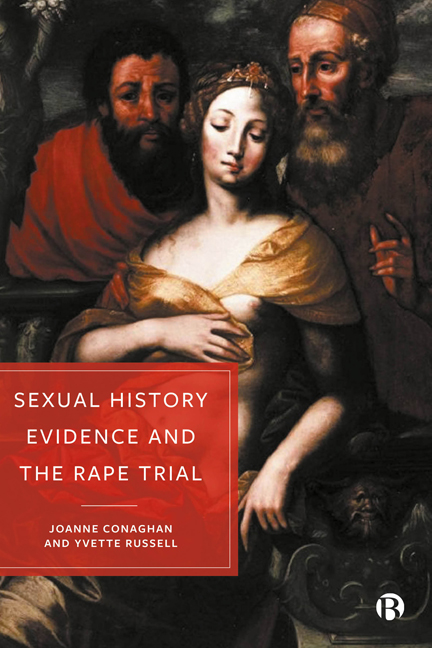Book contents
- Frontmatter
- Contents
- List of Cases
- List of Statutes
- About the Authors
- Acknowledgements
- 1 Introduction: Setting the Scene
- 2 A History of Rape Law in Action
- 3 Emergence of a Legal Regime Governing the Use of Sexual History Evidence
- 4 Legal Regulation: Limits and Potentialities
- 5 Tracking the Use of Sexual History Evidence in the Courtroom
- 6 The Relevance of Sexual History Evidence
- 7 Sexual History Evidence and Subjectivity
- 8 Conclusion: What Is to Be Done about Sexual History Evidence?
- References
- Index
7 - Sexual History Evidence and Subjectivity
Published online by Cambridge University Press: 03 April 2024
- Frontmatter
- Contents
- List of Cases
- List of Statutes
- About the Authors
- Acknowledgements
- 1 Introduction: Setting the Scene
- 2 A History of Rape Law in Action
- 3 Emergence of a Legal Regime Governing the Use of Sexual History Evidence
- 4 Legal Regulation: Limits and Potentialities
- 5 Tracking the Use of Sexual History Evidence in the Courtroom
- 6 The Relevance of Sexual History Evidence
- 7 Sexual History Evidence and Subjectivity
- 8 Conclusion: What Is to Be Done about Sexual History Evidence?
- References
- Index
Summary
Introduction
In the previous chapter, we saw how relevance operates as an ideologically imbued intellectual construct that purports to manage the admission of sexual history evidence in the rape trial. We argued that the doctrine and discourse of relevance, in governing the use and admission of sexual history evidence in the rape trial, is just as infused with gendered assumptions as other aspects of the framework that governs rape law and policy. Recognising the ways in which so many elements of law, policy and practice that touch sexual violence are shot through with the patriarchal legacy we have been tracing in this book shows how even ostensibly neutral legal concepts like relevance are liable to corruption or perversion where sexual violence is concerned. In this chapter, we shift register slightly to consider what a feminist philosophical and psychoanalytic frame can tell us about the ways in which the ‘patriarchal legacy’ continues to feature in rape law and practice.
Feminists have frequently observed that rape law reflects the perspective of the perpetrator rather than the victim. As Catharine MacKinnon bluntly puts it: ‘[T] he fact that the law of rape protects rapists and is written from their point of view to guarantee impunity for most rapes is officially regarded as a violation of the law of sex equality, national or international, by virtually nobody’ (2006: 25). Far from being neutrally drafted and applied, feminists have long pointed to burgeoning attrition rates and survivor narratives of trauma while engaging with the criminal justice system to evidence the claim that laws on rape simply do not work. Of critical importance here is the feminist insight that rape law and discourse mirror the offence itself by treating the victim of rape as an object rather than a subject, a designation which militates against their proper recognition before the court as a legal person. The operation of sexual history evidence in the rape trial further complicates this designation, disrupting the linearity of the story of violation a prosecutor might be trying to tell and often investing a complainant with a complex and contradictory form of agency.
- Type
- Chapter
- Information
- Sexual History Evidence and the Rape Trial , pp. 161 - 183Publisher: Bristol University PressPrint publication year: 2023



